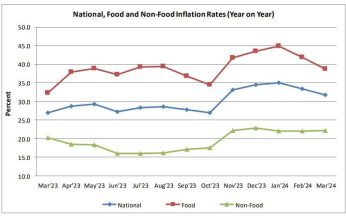Malawi is a technological laggard—WEF
Malawi is a technological laggard according to the World Economic Forum (WEF) while a local ICT specialist has said this is not surprising although the country has implemented certain relevant policies.
The WEF, in the 2014 Global Information Technology Report, has ranked Malawi on 132 out of 148 economies down from 129 in the previous report and has described the Malawi as laggard in terms of Networked Readiness Index (NRI).
 Other countries in the group whose NRI score is below average and that are lagging increasingly behind include Benin, Botswana, Burundi, Chad, Mozambique, Timor-Leste, and Tunisia.
Other countries in the group whose NRI score is below average and that are lagging increasingly behind include Benin, Botswana, Burundi, Chad, Mozambique, Timor-Leste, and Tunisia.
Commenting on the description in an e-mail on Tuesday, a local Information and Communication Technology (ICT) specialist who sought anonymity said although there are some achievements that have been made stakeholders need to do a lot.
“It is still disappointing that there appears to be very little understanding and skills among key stakeholders on how to align various forms of technologies to government’s strategic objectives.
“To a large extent, most of them appear to believe that mere acquisition of technologies would solve all our problems. They appear not to understand that technologies influence and are influenced by a myriad of factors within the context of their adoption and use.
“This is where issues of ICT policy and strategic planning become very relevant. Unless we begin to take serious measures to critically engage with such issues, we shall still remain technological laggards,” said the specialist.
In the 2014 WEF report, Malawi scored an overall 2.9 out of a possible seven on NRI, a marginal improvement from 2.8 in the previous report.
According to the report Malawi did best on political and regulatory environment having been ranked 69 but did poorly on individual usage on rank 142.
But the government appreciates the importance of ICT in sustainable development.
According to the 2013 ICT Policy, government aims at developing the ICT sector, promoting the development and use of ICT in all sectors and enhancing universal access to the services.
Government,however, notes that the implementation of the ICT policy may be affected by low levels of ICT literacy levels.
Government further appreciates that inadequate ICT infrastructure especially in the rural areas, underdeveloped research and development capacity in the sector, and inadequate specialised ICT professionals and institutional capacity.
Authorities also appreciate that high investment cost for ICT infrastructure, low levels of online public services and low levels of engaging the citizens using ICT as some of the problems.





